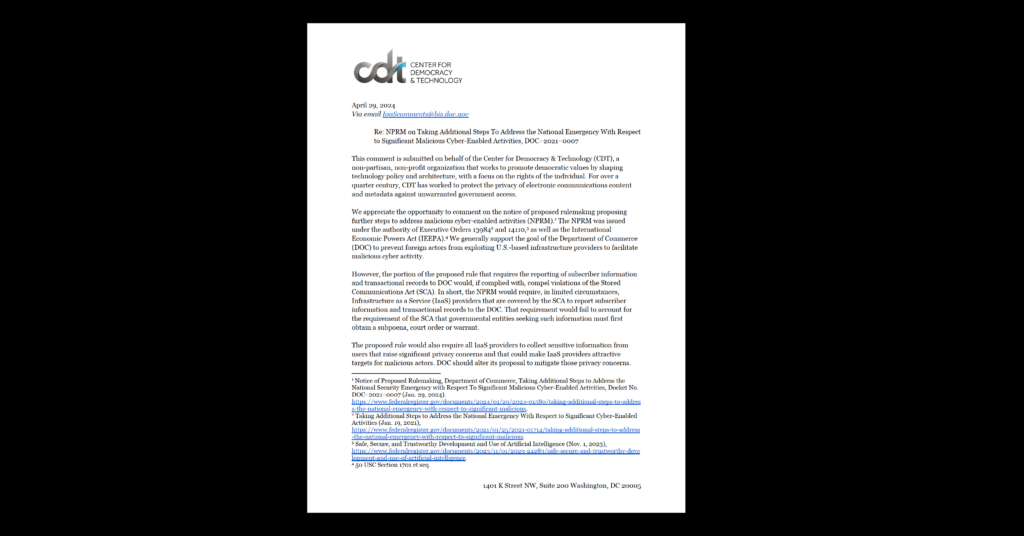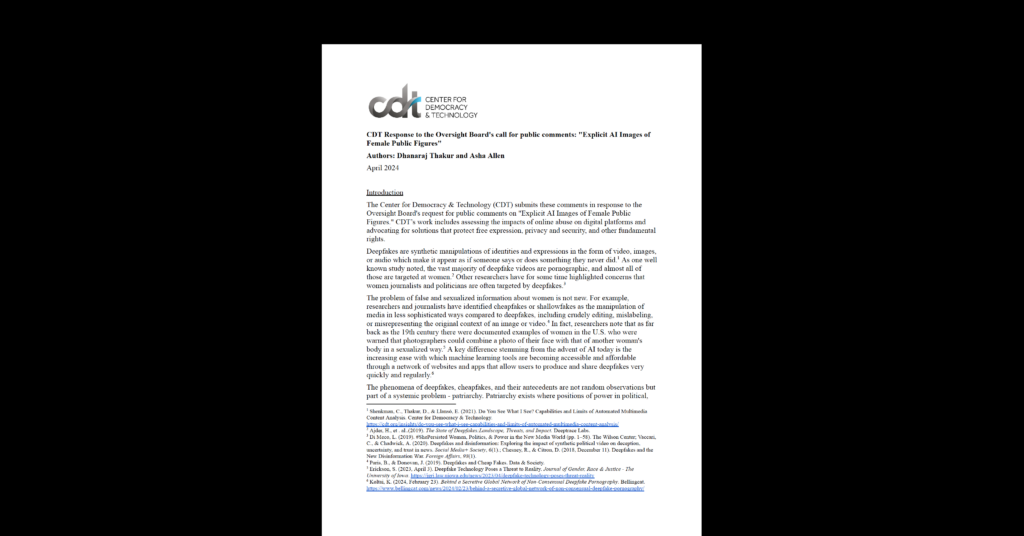European Policy, Free Expression, Government Surveillance
EU Tech Policy Brief: August 2023
Also authored by CDT Europe’s Vânia Reis and Rachele Ceraulo
This is the August 2023 issue of the Centre for Democracy & Technology Europe‘s monthly Tech Policy Brief. It highlights some of the most pressing technology and internet policy issues under debate in Europe, the U.S., and internationally, and gives CDT’s perspective on them. Our aim is to help shape policies that advance our rights in a digital world. Please do not hesitate to contact our team in Brussels: Iverna McGowan, Asha Allen, and Ophélie Stockhem.
CDT Europe Raises Concerns Over Warrantless Digital Searches in CSA Regulation
In a new op-ed, CDT Europe Director Iverna McGowan raised the alarm at the flawed logic of the European Commission’s proposal to prevent and combat child sexual abuse online. She raised strong concerns about the risks the law poses to fundamental rights and the rule of law, which could undermine the very goal the proposed law seeks to achieve – fighting child sexual abuse and keeping children safe online.
McGowan underlined that the proposed regulation would introduce a system of warrantless searches of online communications, meaning that all users’ private messages would be surveilled, not due to suspected involvement in child sexual abuse but simply due to use of a service such as Whatsapp or Signal. Warrantless digital searches, coupled with the proposal’s overreliance on error-prone and unfeasible detection technologies, could result in content being wrongfully flagged to law enforcement, with life-altering consequences for those involved.
This approach, warned McGowan, runs counter to several basic tenets of criminal law: prominently, the need for a warrant based on reasonable suspicion of wrongdoing before initiating a search, and the presumption of innocence. In order to bring the proposal in line with human rights law, and protect the most vulnerable children, McGowan stressed the need to fundamentally move away from the proposed system, in favour of one that would incorporate carefully crafted detection warrants overseen by independent judicial bodies.
Civil Society Demands Clarification from EU Commissioner on Possible Internet Shutdowns
In late July, CDT Europe joined over 60 civil society partners in an open letter addressed to EU Commissioner for the Internal Market, Thierry Breton, seeking clarification on concerning comments he made suggesting that the EU Digital Services Act (DSA) allows blocking of online platforms that don’t ‘immediately’ remove hateful content. Advocates highlighted the danger of such comments, which could be used to reinforce the weaponisation of internet shutdowns globally, and which fundamentally mischaracterised the rules laid down by the DSA.
The joint efforts of civil society had an impact: Commissioner Breton issued a detailed and clarifying response after less than 24 hours. In agreement with civil society, Breton clarified that the DSA does not allow arbitrary shutdown of online platforms as a sanction, but does leave open the possibility for proportionate sanctions measures, including temporary restriction of access to an online platform’s services after repeated violations and noncompliance with the regulation. Civil society welcomed this swift response, and will continue to liaise with the Commissioner and his team to ensure that both EU institutions and member states enforce the DSA in the most human rights-respecting manner.
Civil Society Engages in a Dialogue with the UN High Commissioner and EESC for Human Rights Protection
On 20 July, CDT Europe Director Iverna McGowan joined a civil society dialogue at the European Economic and Social Committee, with the UN High Commissioner for Human Rights. The discussion provided a platform for civil society organisations to share their concerns and perspectives on specific issues.
On the subject of online expression and civic space, McGowan highlighted that, whilst the DSA has the potential to mitigate, prevent, and remedy human rights violations, certain loopholes remain, such as law enforcement acting as trusted flaggers of online content, which can pose risks to freedom of expression and the right to equality before the law.
McGowan also called upon the High Commissioner to ensure that the framework proposed by UNESCO on platform regulation serves to strengthen, and not undermine, a human rights-based approach. She also referenced CDT’s input to the OHCHR report on human rights and technical standard-setting processes, and called for active engagement with communities of affected people and representation from civil society, both during the standard-setting process and as the standards are being implemented. In this light, she further emphasised the need to support and bolster civil society participation to make technical standard-setting more accessible and inclusive.
CDT Europe Hiring Two Programme Directors to Strengthen Digital Rights Protection Efforts
We are excited to announce that CDT Europe is expanding and looking for two Programme Directors, who will be tasked with leading advocacy on key policy areas, to join the team. These roles will focus on important areas within the digital aspects of human rights: Security and Surveillance, as well as Equity and Data.
Programme Director, Security and Surveillance: This position focuses on the intersection of human rights, security, and surveillance. The successful candidate will take responsibility for engaging with various stakeholders and developing a strategic advocacy plan on a vision of the EU’s Dual-Use Regulation, including the Child Sexual Abuse Material Regulation.
More details and application information are available on CDT’s website.
Programme Director, Equity and Data: This position focuses on addressing issues related to data equity and human rights protection in the digital landscape, and through the EU’s Role in global policymaking on artificial intelligence and privacy. It involves taking responsibility for projects about data privacy, digital inclusion, algorithmic bias, and equal access to technology.
More details and application information are available on CDT’s website.


